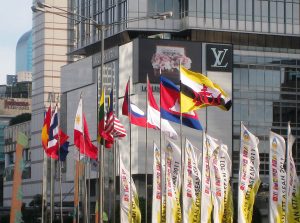The leaders of Malaysia and Indonesia have called for the Association of Southeast Asian Nations (ASEAN) to convene a special meeting to address the escalating political situation in Myanmar.
The Myanmar military, or Tatmadaw, took power in the country on February 1, alleging irregularities in a November election won in a landslide by State Counselor Aung San Suu Kyi and the National League for Democracy. The coup resulted in immediate protests, which continue to gather pace across Myanmar.
The call came as Indonesian President Joko “Jokowi” Widodo hosted Malaysia’s Prime Minister Muhyiddin Yassin, during the latter’s visit to Jakarta on February 5 – his first as Malaysia’s leader.
After bilateral talks, the two leaders announced that they had asked their foreign ministers to talk to Brunei, the current ASEAN chair, to try to set up the special Myanmar meeting. Muhyiddin referred to the military takeover as representing “one step backward in the process of democracy in that country.”
Such special meetings are not common for ASEAN, which operates according to principles of mutual non-interference and tiptoes around anything that could be construed as “interference” in member states’ internal affairs. But the 10-nation bloc is coming under increasing pressure to take action following the coup in Myanmar, which terminated a decade-long process of significant, if partial, political reforms.
Shortly after the coup, Brunei responded with a statement as ASEAN chair, urging “the pursuance of dialogue, reconciliation and the return to normalcy in accordance with the will and interests of the people of Myanmar.” It also referenced “the purposes and the principles enshrined in the ASEAN Charter, including, the adherence to the principles of democracy, the rule of law and good governance, respect for and protection of human rights and fundamental freedoms.”
This registered as an unusually robust statement for ASEAN, but it’s still unclear whether the bloc can gain the requisite consensus to take more concerted action. In the past, ASEAN has taken special steps in response to events in Myanmar, and even forced it to give up the rotating chairmanship of the bloc in 2006, demonstrating some flexibility in its interpretations of the notion of “non-interference.”
But while ASEAN’s operating principles impose limits on its ability to take concerted action, it also faces a second shortcoming: a dearth of vision and leadership. In the aftermath of the coup, three ASEAN member states – Thailand, Cambodia, and the Philippines – refused to comment on the grounds that it was Myanmar’s “internal affair.” The ASEAN Intergovernmental Commission on Human Rights (AICHR), the body officially tasked with promoting and protecting human rights in ASEAN, put out a statement stating that it was “extremely concerned” about the coup, but it contained the signatures of just four nations’ delegates.
As Sahil Mathur noted in these pages last week, it is perhaps too much to expect a coercive interventionist response from ASEAN to the Myanmar coup, given its background and founding principles. But there is a clear need for it to find more effective ways to respond to crises in its neighborhood.
Also in their meeting, Malaysia and Indonesia pledged to support one another in fighting back against proposed regulatory changes that could restrict the sale of palm oil within the EU. The announcement comes a month after reports that the two nations, two of the world’s largest producers of palm oil, are joining forces to lobby against the European bloc’s measures. “Indonesia continues the fight against palm oil discrimination,” Jokowi and Muhyiddin said in a joint press conference. “Our fight will begin to bite if we do it together and Indonesia is hoping that Malaysia shares the same commitment regarding this palm oil issue.”

































